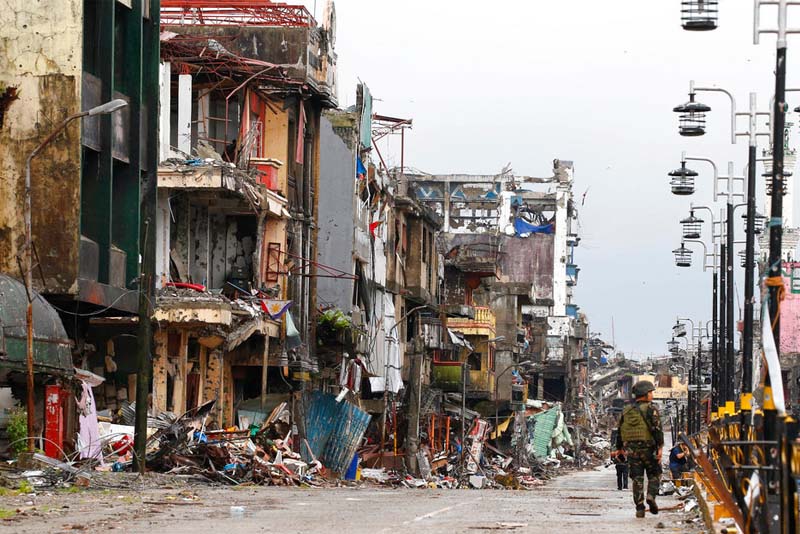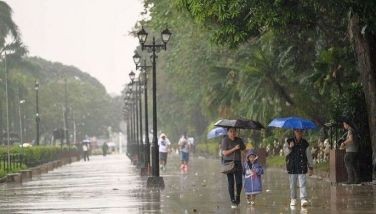Rights group: Soldiers, militants violated international law, human rights in Marawi siege

Both the Philippine military and militants inspired by the Islamic State group committed violations of international humanitarian law and human rights in the battle of Marawi City, a report by rights group Amnesty International said on Friday. AP/Bullit Marquez, File
Military denies allegation, vows probe
MANILA, Philippines — Rights group Amnesty International said in a report on Friday that both government forces and Islamist militants committed violations of international humanitarian law, some of which could amount to war crimes, during the five-month siege of Marawi City.
The human rights group said that Philippine security forces violated the prohibition on the use of torture and other ill-treatment of people in their custody, adding that most of the violations were carried out against civilians who were escaping from the besieged lakeside town and seeking military protection.
"Amnesty International interviewed eight victims who described being subjected ill-treatment by Philippine government forces. Seven of the eight victims were Christian construction workers, who, prior to their detention, had been trapped in Marawi City because they feared being captured or killed by militants if they tried to escape," the London-based group said in its new report, "The Battle of Marawi: Death and Destruction in the Philippines."
READ: Marawi siege 'most serious terror event' in Southeast Asia in past 15 years
The Armed Forces of the Philippines denied that its personnel committed rights and international law violations and vowed to investigate the allegations and discipline those found guilty.
Brig. Gen. Restituto Padilla stressed that the military top brass ordered soldiers involved in the five-month battle to respect international humanitarian law and human rights as they tried to take back the city from the claws of militants inspired by the Islamic State group.
"Our actions during the Marawi conflcit were guided by the rules of conflict which provide for the necessity and proportionality in the use of force," Padilla quoted military chief Gen. Rey Leonardo Guerrero as saying.
Amnesty also accused some soldiers of detaining numerous people and accusing them of being militants without evidence.
It also alleged that detainees were subjected by security personnel to "various forms of ill-treatment including sustained beatings and threats of execution. Torture and other ill-treatment have also been reported by human rights monitoring groups in Mindanao."
According to the rights group, the military violated norms of customary international law prohibiting torture or cruel or inhumane treatment as well as international treaties that banned torture: Common Article 3 to the Geneva Conventions, the Convention Against Torture, and the International Covenant on Civil and Political Rights.
Both government soldiers and militants were also alleged to have looted deserted pieces of property in the city, with military officials admitting that some of their personnel were caught stealing and stating that some have already been charged.
The IS-inspired terrorists were also documented by the study to have committed grave violations of international humanitarian law and human rights, many of which were tantamount to war crimes, according to Amnesty.
According to the report, the militants regularly targeted and carried out numerous extrajudicial executions of non-Muslim residents especially at checkpoints as the residents tried to flee the fighting.
"Militants often gave civilians a de facto religious test prior to killing them; they were asked to recite the Shahada, which is an expression of Muslim faith, or to respond to Muslim greetings. Civilians who did not recite the Shahada or failed to respond appropriately were often summarily executed," Amnesty said.
In other instances, the group said, the militants justified the killings by saying that the civilians were government intelligence agents.
The militants performed the killings with a pistol or rifle or by cutting the victim's throat while in some instances the victims were decapitated, according to the group.
"Most victims were shot and killed immediately after being questioned by the militants. Most victims were shot and killed while standing or kneeling on the ground; some were shot and killed while running away," it said.
READ: ISIS central provided Marawi militants with funding, says report
The militants also harmed and physically abused the hostages captured during the first few days of the battle, the report said.
Amnesty also stressed the need for an investigation to see if the AFP's artillery and air strikes and their attendant loss of civilian life and infrastructure damage were "militarily necessary and proportional."
"Such an investigation is essential to determine whether the Philippine armed forces operated in accordance with their obligations under IHL and, in turn, whether civilians were unlawfully killed and infrastructure was unlawfully destroyed," it said.
Amnesty urged the government to investigate international law and rights violations and bring to justice those suspected of criminal responsibility.
It also stressed the need to give victims remedy and reparations, including restitution, compensation, rehabilitation and guarantees or non-repetition and to rehabilitate the war-torn city.
The group also called on the lifting of martial law and the repeal of the suspension of the writ of habeas corpus still in effect in Mindanao, an island of around 22 million.
The battle for Marawi City displaced more than 360,000 of the Islamic town and neighboring areas and killed at least 920 militants, 165 soldiers and 47 civilians.
The government said that at least P50 billion would be needed to reconstruct the lakeside town most of which had been turned into smoldering ruins.
- Latest
- Trending































